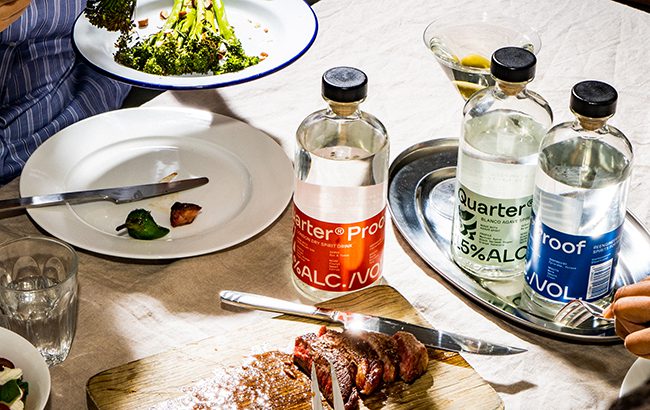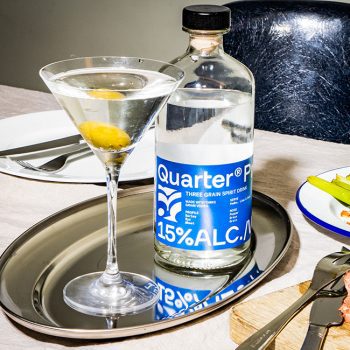Quarter Proof rebrands due to legal challenges
UK-based brand Quarter Proof, which creates spirits with lower ABVs, has rebranded and adapted its products due to labelling guidelines.

Founded in 2021, the brand, which was formerly named Quarter, created alternatives to gin and Tequila, which were bottled at 12% ABV. It described its range as ‘lighter spirits’ and named them ‘G/N’ and ‘T/quila’, but disputes with a local council have forced it to rename its products and adapt the ABV.

“It’s been really challenging for us,” explained co-founder Rohan Radhakrishnan. “We have never tried to dupe the consumer into thinking this is a gin or a Tequila – if anything, we’ve been incredibly direct. Our brand is called Quarter because our spirits are quarter strength – we’re calling it a light spirit. We also weren’t writing ‘Tequila’, signifying that there’s something different about it. And we clearly labelled the ABV as 12%.”
Radhakrishnan explains the brand estimates it has lost more than £100,000 (US$127,000) in revenue due to the legal challenges, with its product being taken off Amazon.
“A local council deemed our products to be against the guidelines,” he explained. After explaining to the council that the production methods for both G/N and T/quila followed international guidelines for everything other than the ABV, the council described the products’ positioning as ‘a matter of opinion’.
The labelling of no-and-low products has caused the industry a lot of confusion in recent years, with the Wine and Spirit Trade Association (WSTA) publishing guidelines last year in the absence of updated legislation from the Department of Health and Social Care (DHSC).
However the WSTA’s guidelines mainly cover non-alcoholic products (anything below 0.05% ABV) and low-alcohol products (below 1.2%), with Quarter Proof’s range sitting outside. “We’re a totally new category,” added Radhakrishnan. “Parameters don’t currently exist for this middle-ground category where Quarter Proof sits.”
While the council’s decision has set the brand back significantly, Radhakrishnan doesn’t hold a grudge: “We don’t want this narrative to be a rumble against the authorities. If anything, we’ve only wanted to work with them to find a solution. We’ve had conversations with the Consejo Regulador de Tequila, which is the global Tequila body, and The Gin Guild. We’re all trying to navigate this uncharted territory.”
The solution – Radhakrishnan hopes – lays in renaming G/N to ‘London Dry Spirit’, which it is permitted to describe as being ‘made with London Dry Gin’, and T/quila to ‘Blanco Agave Spirit’, which is ‘made with Tequila’. The brand has also increased the ABV of both products from 12% to 15% to secure its positioning as a ‘spirit drink’.
“There are non-alcoholic ‘spirits’ that are able to call themselves ‘spirits’, because that category has legal guidelines around it,” explained Radhakrishnan. But, despite being created using copper pot stills and bottled at 12% ABV, Quarter Proof’s products had less of a right to describe itself as a ‘spirit’ than something that isn’t distilled at all.
“It’s been a journey – a frustrating one, because we’re really not trying to do anything harmful to our retail partners, our wholesale partners or the consumer. We’re trying to promote more mindful drinking for both the body and the mind.
“Our utopia would be to have a 0.0% ABV category which is non-alcoholic, then a low-alcohol space, and then a light space. But we all need to work out what those boundaries are.”

As well as relaunching the brand, Quarter Proof will release its third 15% ABV expression in June – a ‘Three Grain Spirit’ that is made with vodka. As with its other two products, Three Grain Spirit is created through a process the brand calls ‘fractionation’, which sees it distilled to full proof by master distiller Anthony Wilson before the heart is cut, diluted and tested to see if it retains the appropriate flavours at a lower ABV.
In the Three Grain Spirit, this process is carried out for the separate grain distillates before they are blended for the final product, which is described as a ‘complex spirit with a spicy finish’.
While Radhakrishnan anticipates that further expressions will come, the focus right now is establishing the new brand positioning. “We’re a small team and a small business. We have to do it in the right order.”
Related news
Jim Beam unveils second Lineage release
